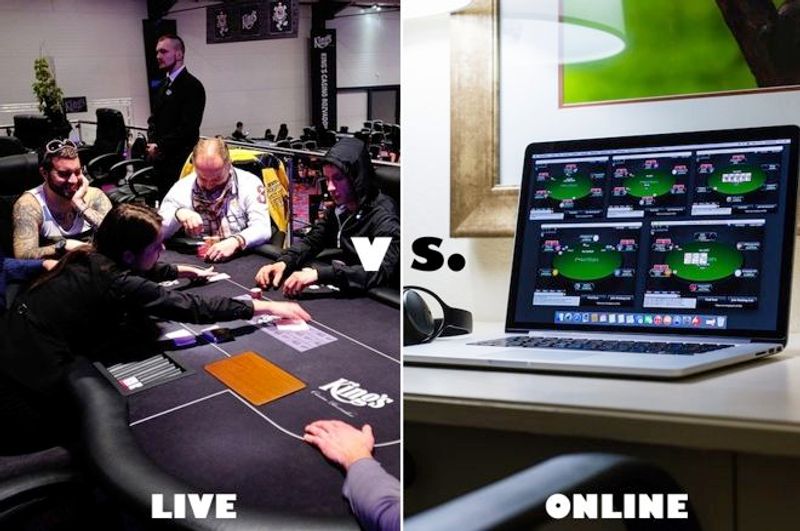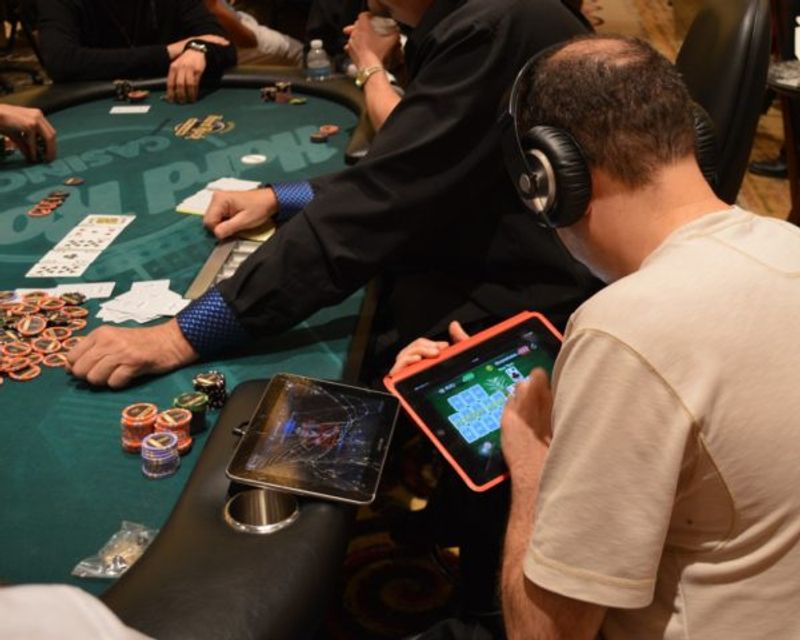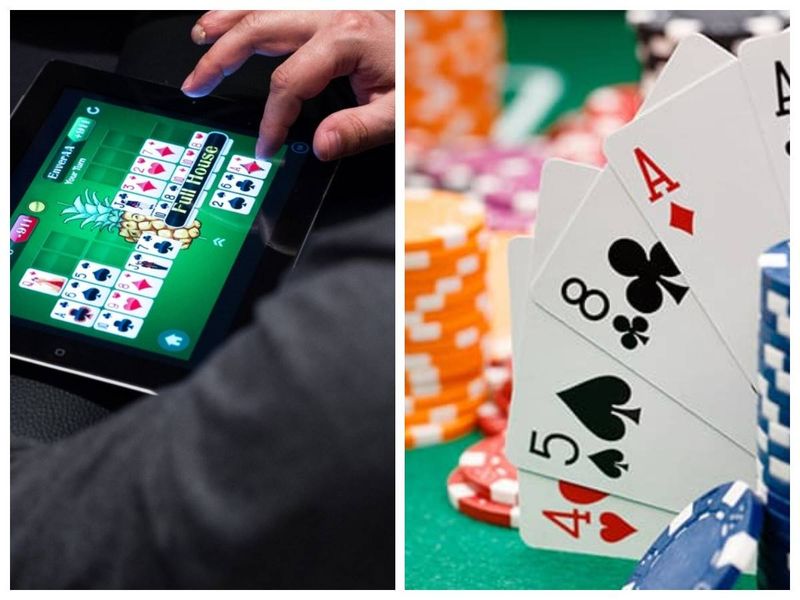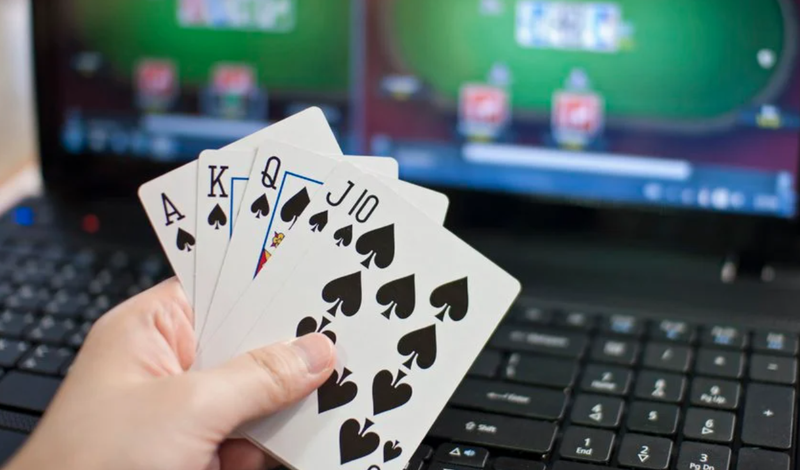The difference between live and online poker goes beyond just the method of play; it also encompasses the overall experience each format offers. While live poker allows you to immerse yourself in the atmosphere of a real casino and interact directly with opponents, online poker provides convenience and flexibility, allowing you to play from anywhere and at any time. Understanding these differences will help you choose the poker format that best aligns with your preferences and goals.

Live poker takes place at physical casinos, while online poker is played on internet platforms
The Difference Between Live and Online Poker
The differences between live and online poker are significant and affect the overall experience and strategy of the game. Understanding these distinctions will help you choose the format that best suits your preferences and optimize your chances of success.
Gameplay Speed
Live Poker
-
Slower Pace: In live poker, each hand typically takes longer due to the time needed for dealing cards, players considering their actions, and betting. Every action, such as checking, folding, or calling, takes more time.
-
Decision Time: Players have more time to think and make decisions, allowing them to carefully consider various factors before acting.
Online Poker
-
Faster Pace: Online poker progresses quickly, with each hand taking only a few minutes. Software automates dealing and managing player actions, speeding up the game.
-
Limited Decision Time: Players have less time to make decisions as the software often enforces time limits for each action.
Number of Tables
Live Poker
-
Single Table: In live poker, players typically participate in only one table at a time. This limits the number of hands they can play within a given period.
-
Focused Attention: Playing one table allows players to concentrate fully on the game and their opponents.
Online Poker
-
Multiple Tables: Online poker allows players to join multiple tables simultaneously. Some professional players can manage 8-12 tables at once.
-
Increased Opportunities: Playing multiple tables increases the number of hands played in a given period, thereby boosting chances of winning and profit.
Social Interaction
Live Poker
-
Direct Interaction: Players can see their opponents, read their body language and gestures to infer their hands. Factors such as eye contact, attitude, and hand movements can provide valuable information.
-
Communication: Direct conversation and interaction with other players create a social and engaging environment, helping build relationships and enhance the gaming experience.
Online Poker
-
Limited Interaction: Online poker lacks direct interaction, making it impossible for players to use body language and gestures to guess opponents' hands.
-
Analytical Tools: Players rely on tools and software to track betting behavior and make decisions.
Technical Aspects
Live Poker
-
Dealing Skills: The accuracy and fairness of the game depend on the dealer’s skills and the casino’s regulations.
-
Direct Observation: Players can directly observe each action of the dealer and opponents, which can inform their strategic decisions.
Online Poker
-
Software and Algorithms: Online poker relies on software and algorithms to deal cards and manage the game. This ensures speed and consistency but depends on the transparency of the software provider.
-
Support Tools: Players can use support tools like HUDs (Heads-Up Displays) to track statistics and analyze opponents.

Live poker allows for direct interaction with opponents, whereas online poker communication is limited to chat
Promotions and Rewards
- Live Poker: Fewer promotions, typically limited to special tournaments or loyalty programs.
- Online Poker: Many promotions, welcome bonuses, and ongoing rewards for players.
Participation Costs
- Live Poker: Higher costs, including travel, dining, and tournament entry fees.
- Online Poker: Lower costs, requiring only an internet connection and playing device.
Playing Hours
- Live Poker: Limited by casino or poker club operating hours.
- Online Poker: Available anytime, 24/7, offering greater convenience for players.
Betting Limits
- Live Poker: Often higher betting limits, suited for professional players.
- Online Poker: Various betting limits from low to high, catering to a wide range of players.
Security
- Live Poker: Security depends on the casino and direct management.
- Online Poker: Security depends on the software provider and cybersecurity measures.
Learning Opportunities
- Live Poker: Harder to review previous hands unless you take notes.
- Online Poker: Easy to review hand histories and use analysis tools to improve skills.
Understanding the differences between live and online poker will help you choose the format that best suits you, optimize your strategy, and enhance your poker experience.

The cost of participating in live poker is generally higher than that of online poker
Should You Play Live Poker or Online Poker?
The differences between live poker and online poker are quite distinct. Both formats have their own advantages and disadvantages, and the choice between them depends on your personal preferences and goals. Here are some points to consider:
Live Poker
Advantages
- Social Interaction: You can meet and chat with others, which can enhance the entertainment value of the game.
- Skill Practice: Observing opponents' expressions and behaviors can help you detect signs of bluffing or other strategic elements.
- Real Experience: The atmosphere and experience of being in a real casino can be very engaging and exciting.
Disadvantages
- Higher Costs: Expenses such as travel, dining, and entry fees can significantly increase the overall cost.
- Time and Effort: You need to allocate time to travel to the casino and participate in the game, which may not be convenient for everyone.
Online Poker
Advantages
- Convenience: You can play from anywhere and at any time, as long as you have an internet connection.
- Lower Costs: There are no entry fees or travel expenses, and you can choose stakes that fit your budget.
- Variety: A wide range of games and tournaments are available, with the option to play multiple tables simultaneously.
Disadvantages
- Lack of Social Interaction: There is no opportunity for face-to-face interaction with other players.
- Difficulty Reading Opponents: Without non-verbal cues, it can be harder to read opponents and detect bluffing.
Depending on your personal preferences and goals, both formats can offer enjoyable experiences. You might consider trying both to see which one suits you better.

Live poker allows for multi-table play, which is not possible in live poker
In summary, the differences between live and online poker are not just about the method of play but also reflect the distinct advantages and disadvantages of each format. If you enjoy social interaction and the authentic casino experience, live poker might be the ideal choice. Conversely, if you prioritize convenience and flexibility, online poker will meet your needs. Regardless of which format you choose, it’s important to find the way of playing that makes you feel comfortable and allows you to enjoy the game to the fullest.


























